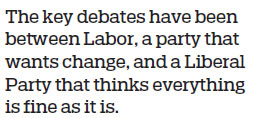Climate change key poll issue in Australia
Australians will go to the polls on Saturday to elect the 46th Parliament.
It is fair to say that even before Australian Prime Minister Scott Morrison announced the date on April 11, the treasurer's budget speech and opposition leader Bill Shorten's budget reply the previous week were the opening shots of the campaign. Both speeches laid bare the ground on which the two major parties would do battle.
While the election has been touted by some in the media as a "climate referendum", Morrison himself stated that this election would be about trust - "Who do you trust to deliver that strong economy which your essential services rely on?"
The campaign is now largely over, with little time left before election day. The advertising has been relentless, and the campaign apparently hard fought.
Shorten's Labor Party has enjoyed a lead in opinion polls, as it has done for much of the time since the last election in 2016. Polling during the campaign has seen the Labor Party remaining consistently ahead, at between 51 and 52 percent of the vote.
While being behind at the beginning of an election race is not fatal to a party's chances, it is always better to be in front, so the Labor Party will be feeling confident going into this election.
The campaign has been largely fought between the two party leaders, Morrison for the governing Liberal Party, and Shorten for the Labor Party.
Morrison and his strategists have clearly decided he is the best person to carry his party's message, and so he has kept his ministers on a tight leash. Whether intended or not, this appears as though he lacks trust in them.

Shorten, on the other hand, has felt confident enough to use his shadow ministers to sell the party's message.
The key policies being fought over have largely been those of the Labor Party. Since the beginning of the year, Shorten has been announcing policies, which Morrison and the Liberal Party have been waging a rearguard action against.
Whether it is climate change, assistance for cancer patients, adjustments to the tax system or economic management, the key debates have been between Labor, a party that wants change, and a Liberal Party that thinks everything is fine as it is.
What do we know about the two leaders and their policies? Morrison secured prime ministership following what might be called a "palace coup" against his predecessor Malcolm Turnbull in October 2018.
Turnbull's own ascension was via the same manner, over Tony Abbott two years previously. A question of democratic legitimacy still hangs over Morrison's head.
For Shorten this is less the case, having been elected to lead the Labor Party after Kevin Rudd's election defeat in 2013.
Shorten has led his party since the last time they were in government, and he came close to toppling Turnbull in the 2016 election. His party considers this election as his best chance to win power.
Of the other parties in the election race, the Greens and One Nation are both likely to do best among a large crop of minor parties.
The Greens have again called this election a "climate referendum", while the latest Intergovernmental Panel on Climate Change - an intergovernmental body of the United Nations, dedicated to providing the world with an objective, scientific view of climate change - announcements suggest the time for climate action is short. The Greens would cancel the Adani coal mine, expand public health provision under Medicare, and remove university education fees.
Pauline Hanson's One Nation, and the smaller Shooters, Fishers and Farmers Party, have capitalized on what they see as neglect of rural and regional Australia, and the pandering of Australian governments to overseas interests.
While not explicitly racist, Hanson's party has argued that the country should dramatically cut immigration.
The race is nearly over, but as the old adage goes, "A week is long time in politics" - so we will just have to wait until election night to really know who will govern Australia into the century's third decade.
Stewart Jackson is a lecturer and postgraduate coursework coordinator at the Department of Government and International Relations, School of Social and Political Sciences, University of Sydney. The views do not necessarily reflect those of China Daily.
(China Daily Global 05/17/2019 page12)


















